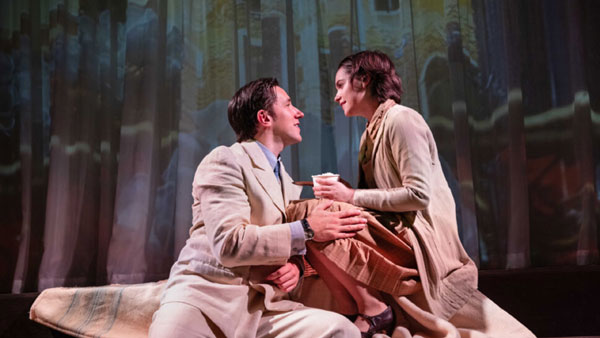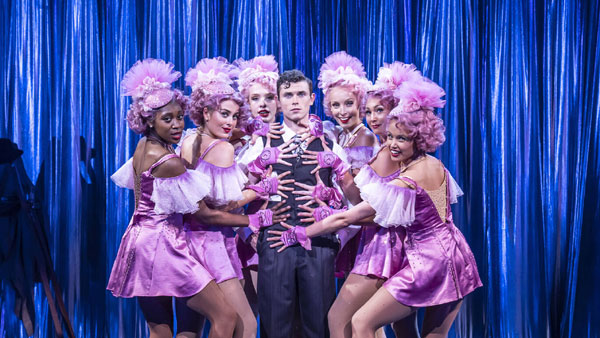|
This
year's visit to London was
enriched by seven plays
spanning a wide range of
genres from classic
chestnuts like Agatha
Christie's Witness for the Prosecution to the gripping new play about Indian independence, The Father and the Assassin,
and then on to five
American musicals –
some new, some old, some
considerably re-
imagined. Variety of
material and versatility
of performance and
production styles marked
the experiences, and while
some of what we saw,
seemed to misfire, several
evenings proved truly
memorable.

Our theatregoing began with the long-running (seven years) Witness
for the Prosecution staged by Lucy Bailey in The Chamber at London
County Hall, an actual courtroom on the South Bank. The dramatic
venue is, in itself, one of the major factors that insures the production's
spellbinding impact. Entering by several imposing staircases, we
finally make our way into the horseshoe-shaped, dark wood-paneled
interior, where tiered seating encircles the thrust stage and the
audience sits on wooden benches with small desk-like shelves in front
of them that suggest they are part of the official proceedings. A small
section of the audience sits in chairs reserved for the jury and
eventually take part in the play itself. William Dudley's spare and
arresting set, lit in stark contrasts by Chris Davey, is dominated by the
judicial bench above which hangs ominously the figure of Lady Justice
with her scales. Actors use all the entrances in the circumference of the
hall, making the audience feel surrounded and immersed in the
proceedings.
Christie's play, like all her mysteries, is brilliantly crafted, offering hair
-raising twists and turns that keep the viewer on the edge of his seat,
and keep the final outcome uncertain until the very last moment. The
cast sustains this mysterious manipulation of the audience, playing
characters whose motives and true nature are mostly inscrutable. In an
absolutely stunning performance of the chameleon leading character,
Leonard Vole, Benjamin Westerby holds his audience in the palm of
his hand – first convincing them of his naiveté and innocence and later
dashing that faith. As his wife, Romaine Vole, Katie Bucholz gives an
equally nuanced and compelling performance of a woman with many
masks. Stephen Hogan and Paul Ansdell as Leonard Vole's legal
defense offer strong performances, as does the rest of the cast, some
playing multiple roles. Despite the fact that Christie's play's is more
than seventy-five years old, it still resonates with audiences, as it
deeply probes the dark and complicated recesses of the human psyche.

The Father and the Assassin, a new work that opened in September
2023 at the National Theatre's Olivier Theatre – a huge open, indoor
amphitheatre. Anupama Chandrasekhar's epic account of India's long
march to independence, Gandhi's nonviolent leadership, the bloody
events surrounding partition, and Gandhi's assassination is told in
sweeping, episodic fashion, periodically pausing to focus on some of
the story's central figures. Some of Chandrasekar's best writing comes
in the second act where she finally zeroes in on the fraught relationship
between Gandhi and his ultimate killer, Naturam Godse. The final
scenes with their piercing dialogue are compelling and raise chilling
moral issues. Much of the difficulty with the script is its ambitiousness
and its attempt to cover so much ground within the confines of a single
evening. Director Indhu Rubasingham opts for a staging that is part
scene work, part modern dance movement (Lucy Cullingford,
Movement Director), and she finds some truly heart-stopping
moments like the Salt March in the narrative. Set Designer Rajha
Shakiry's creates a stunningly bare stage dominated by a symbolic web
of unbleached, handspun muslin. Composer Siddhartha Kosta
(additional music David Schrubsole) serves to transport the audience
India and facilitate the flow of the action. The cast is uniformly
excellent with convincing performances by Paul Bazeley as Gandhi,
Marc Elliott as Nehru, Aysha Kala as Vimala, and a tour de force as the
assassin, Godse, by Hiran Abeysekera.
For visitors, part of the impact of The Father and the Assassin comes
from the breathtaking majesty of the Olivier stage, which despite its
1127 seats, still feels intimate because of the incredible sightlines and
by the resources the National Theatre has at its command – from a
huge roster of creatives to an impressive, mostly Indian, cast to
millions in annual government subsidies - to tell a story as complex
and epic as this one. The sheer boldness of the endeavor, especially for
those of us raised in American theatre culture, is quite simply mind
-blowing!

The third evening took us again to London's trendy, bustling South
Bank to the Bridge Theatre at the South Bank Centre to see Nicholas
Hytner's stunningly staged Guys and Dolls. This completely immersive
production makes use of wrap-around seating (in-the-round staging), a
series of central platforms for the actors raised and lowered on
elevators , and a large open space around where standees become part
of the action, filling the "streets of Broadway and cantinas of Havana."
Hytner's direction not only cleverly serves every corner of this house,
but he uses the technological elements as part of the choreography, the
platforms rising, falling, and merging in dancer-like precision. If the
actual dancing is sometimes limited by the space, choreographers
Arlene Philips and James Cousins employ creative illusion to make the
space seem bigger. And, indeed, the reduced space actually gives an
air of verisimilitude to the New York scenes. If there is one caveat to
Hytner's direction, it is that Hytner seems to miss some of the humor
in Guys and Dolls. The musical's Damon Runyan characters should
have a tiny bit of caricature to them – especially in the exaggerated
New Yawk accents – not really captured by the British cast - and while
the two couples do experience conflict and romance, their stories are
meant to pulsate with humor, too. The audience should be in on the
joke of "Adelaide's Lament," while in Hynter's direction, Marisha
Wallace sings her broken heart out quite seriously.
Nonetheless, if one is willing to accept this change of tone, there is so
much to treasure. Wallace has a stunning voice and a-larger-than-life
personality to play the Hot Box leading lady. Daniel Mays is a sweetly
sincere Nathan Detroit; George Ioannides' Sky Masterson a street savvy
con man, who acts the musicals best ballads rather than signing them
in soaring legit fashion. Celinde Schoenmaker is a strong-willed and
more independent Sarah Brown than many, while Cedric Neal brings
down the house – several times - as Nicely Nicely Johnson.
The Frank Loesser score continues to amaze – one hit song after
another – and the technical team who coordinates all the moving parts
of the show with flawless precision is sublime! And last, but not least, a
word of praise for the large audience of "groundlings" as Shakespeare
would have called them. Not only did they willingly stand for three
hours and pay more for the privilege of being close to the action and
sometimes a part of it, but they were models of good theatre behavior,
following the stage operatives' instructions implicitly and insuring that
they in no way impeded the actors or the technicians. Moreover, from
all appearances, they were a largely youthful audience – something
which American theatres would give anything for!

If Hytner's Guys and Dolls was the height of our musical experience on
this trip, Old Friends, the Sondheim revue starring Bernadette Peters
and Lea Salonga, proved sadly to be a disappointment. Billed as "A
Great Big Broadway Show," it seemed, instead, a pedestrian vehicle for
two aging stars supported by a mostly mediocre ensemble. True, there
were Sondheim's glorious songs – some forty-two of them, but these
seemed strangely diminished with the small (by Broadway standards)
fifteen-piece orchestra. The staging of the all-singing/dancing revue by
Matthew Bourne with choreography by Stephen Mear was banal at
best, making some curious choices such as beginning with black formal
wear and slowly transitioned into basic costuming. Salonga's voice is in
good health, and she took on some of the more dramatic numbers from Sweeney Todd and Gypsy, for example, but her interpretations seemed
superficial. Seventy-five-year-old Bernadette Peters, on the other
hand, made the most of her interpretive skills, but her stage presence
and still elegant looks could not compensate for a voice no longer able
to meet the demands of the music. The seventeen-person ensemble
rarely impressed, though Jeremy Secomb and Gavin Lee did make
some noteworthy contributions. Cameron Macintosh intends to bring Old Friends to Broadway, and with the Great White Way's love for
Sondheim and fond regard for Peters and Salonga, it will be interesting
to see how the show fares.

Jamie Lloyd's production of Andrew Lloyd Webber's Sunset Boulevard
is making headlines at the Savoy Theatre for its radical re-imagining of
the musical's concept and casting. Conceived as a vehicle for Nicole
Scherzinger, former Pussycat Doll, Grammy-winning singer, and
transplanted from the grandeur of Hollywood's Golden Age to the
black and white shadowy realm of New Wave Cinema, Lloyd Webber's
production features actors in modern black garb and a live camera
crew filming all the stage action and sharing it in real time with the
audience by onstage screens – a choice that was disturbingly
distracting. Focusing on the darkest aspects of the musical, Lloyd
gives us a story about violent impulses and destructive drives. And
while the results may have some dramatic impact in and of themselves,
the concept has little to do with the world of Lloyd Webber's Sunset
Boulevard. Norma Desmond, Joe Gillis, and the others belong to the
glittering, lush era of Hollywood's grandeur. To transport them to a
grim post-modern world immediately destroys the context.
Scherzinger, as Norma, sings with intensity, but she does not project
any of the character's troubled psychology; she generates little
empathy, and she simply does not convince that she was once a star of
Desmond's magnitude. Tom Francis, as Joe Gillis, also sings well,
though his big number, "Sunset Boulevard" lacks the bitter, tortured
intensity it should have, and his overall characterization is one
-dimensional. As Max, David Thaxton is deprived some of his best
moments by alterations to the script, while Grace Hodgett Young does
her best to convey Betty Schaeffer's sincerity.
What Jamie Lloyd has inflicted on Sunset Boulevard is akin to what
Régie-theater has done to opera for the past half century. Often the
concept is bold, provoking, perhaps even fascinating, but its relevance
to the essence of the drama- and the music – is not always valid. This
production is not about a handful of flawed, but deeply human
characters caught in a complex psychological web played out against a
changing world; rather it has become a cinema verité version of a
murder in cold blood.

In contrast, the production of Michael Kunze and Sylvester Levay's
new musical, Rebecca, based on Daphne DuMaurier's novel, offered a
low-tech, completely conventional production. Produced at the tiny
Players Theatre on Villiers Street near Charing Cross, the simplicity of
the production forced the audience to focus on the work itself and on
the musical and dramatic values. Alas, despite the high potential of Du
Maurier's work to furnish an intensely dramatic theatrical experience,
this musical version of Rebecca falls short. Michael Kunze's book,
translated from the German by the redoubtable Christopher Hampton,
has trouble effectively condensing the intricate novel into some
coherent narrative. The events of the first act happen too quickly and
without much believable motivation, and the slow simmering tension
that creates the Gothic horror never materializes in the second. Some
of the key characters are curiously altered or deprived of crucial
moments: Rebecca's cousin Favell's material is too vaudevillian to
make him a serious villain; Ben never actually discovers the lovers
together, and I's entrance in Rebecca's ball gown has no impact at all.
Alejandro Bonatto's direction does not mine the chilling menace of Mrs
Danvers, or creatively solve the problem of a small ensemble, while
Ron Howell's choreography is sophomoric. The two central roles of I
and Maxim de Winter do have some interesting musical exchanges but
need more gifted singers than Lauren Jones and Richard Carson.
While the material should be a goldmine for musical writers, this
current iteration of the iconic book (and movie) is simply lackluster.

The final theatre evening, however, made up for the inadequacies of
the previous two. The Chichester Festival production of the Gershwins' Crazy for You at the Gillian Lynn Theatre, starring Charlie Stemp, is an
old-fashioned singing-dancing extravaganza that serves up a hearty
dose of feel-good joy. Directed and choreographed by Susan Stroman,
this production pulsates with energy and fun, makes light of the goofy
plot, and focuses on the sheer thrill of the magnificent score and the
exuberant dance numbers. The glitzy visual production with décor by
Beowulf Boritt and lavish costumes by William Ivey Long does its best
to dazzle. Charlie Stemp makes an endearing Bobby Child, and he
commands the stage with his virtuosic dancing. Cary Anderson is a
charming Polly Baxter and her chemistry with Stemp and their vocal
blend is appealing. Tom Edden is an amusing Bela Zangler, just campy
enough. The ensemble dances and sings with great flair. Most of all,
the score - the compendium of inimitable Gershwin hits one after the
other - leaves the audience breathless. Crazy for You, however dated
and predictable its plot may seem, exudes an irresistible and timeless
charm.
London theatregoing is always filled with surprises, and if this year's
selections were something of a mixed bag, there was still that sense of
exploration and discovery. And when the list of discoveries included
such memorable performances as Witness for the Prosecution, Crazy
for You, and Guys and Dolls, the rewards were to be treasured.
|
|